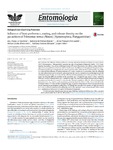Por favor, use este identificador para citar o enlazar este ítem:
http://www.alice.cnptia.embrapa.br/alice/handle/doc/1066604| Título: | Influence of host preference, mating, and release density on the parasitism of Telenomus remus (Nixon) (Hymenoptera, Platygastridae). |
| Autor: | QUEIROZ, A. P. de  BUENO, A. de F.   POMARI-FERNANDES, A.   BORTOLOTTO, O. C.   MIKAMI, A. Y   OLIVE, L.   |
| Afiliación: | ANA PAULA DE QUEIROZ, IAPAR; ADENEY DE FREITAS BUENO, CNPSO; ALINE POMARI FERNANDES, Universidade Federal da Fronteira Sul; ORCEAL CEOLIN BORTOLOTTO, UFPR; ADRIANA YATIEM MIKAMI, UFPR; LOPES OLIVE, Universidade Federal de Rondônia. |
| Año: | 2017 |
| Referencia: | Revista Brasileira de Entomologia, v. 61, n. 1, p. 86-90, Jan./Mar. 2017. |
| Descripción: | We evaluated the influence of host preference, mating, and release density on Telenomus remus (Nixon, 1937) (Hymenoptera: Platygastridae) parasitizing eggs of Spodoptera frugiperda (Smith, 1797) (Lepidoptera: Noctuidae). First, we tested host preference of T. remus (free choice test) offered a choice between eggs of Corcyra cephalonica (Stainton, 1865) (Lepidoptera: Pyralidae) and S. frugiperda. Parasitism capacity and host preference (S. frugiperda) of T. remus reared on either of the two hosts did not differ. Secondly, we evaluated the influence of mating behavior of T. remus females on its parasitism. Only the offspring sex ratio differed between treatments, indicating that the species reproduces by parthenogenesis of the arrhenotoky type. Finally, we evaluated the influence of release density on T. remus parasitism. This was tested by releasing different numbers of the parasitoid per S. frugiperda egg using T. remus reared for different numbers of generations on C. cephalonica eggs. The regression analysis between percent age of parasitism and density of released T. remus females showed a quadratic effect for all tested parasitoid generations (F 35 , F 40 , and F 45 ) with maximum parasitism from 65.07% to 71.69%. Our results allow the conclusion that (a) T. remus prefers S. frugiperda eggs, regardless of the host on which this parasitoid was reared, showing no preimaginal conditioning; (b) Mating does not affect the number of eggs parasitized by T. remus or the development of its offspring; and (c) The optimal T. remus release density when reared on C. cephalonica is between 0.133 and 0.150 females/ S. frugiperda . |
| Thesagro: | Entomologia |
| ISSN: | 1806-9665 |
| DOI: | 10.1016/j.rbe.2016.12.004 |
| Tipo de Material: | Artigo de periódico |
| Acceso: | openAccess |
| Aparece en las colecciones: | Artigo em periódico indexado (CNPSO)  |
Ficheros en este ítem:
| Fichero | Descripción | Tamaño | Formato | |
|---|---|---|---|---|
| Influenceofhost....pdf | 523,4 kB | Adobe PDF |  Visualizar/Abrir |









